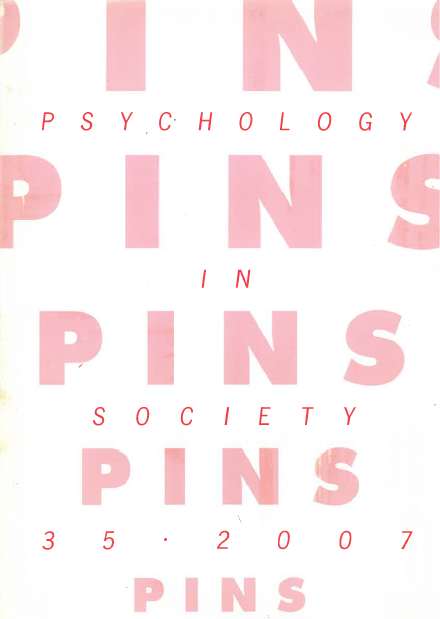CROSS-CULTURAL PSYCHOLOGY: STILL STRUGGLING WITH ITS ENCOUNTERS OF THE OTHER
DOI:
https://doi.org/10.17159//2309-8708/2007/n35a10Abstract
Laungani, P M (2007) Understanding Cross-Cultural Psychology: Eastern and Western Perspectives. London: Sage Publications. ISBN-13: 978-0761971542.
Pages xvi + 280.
Cross-cultural psychology has been at the forefront in demonstrating that psychological phenomena differ according to their cultural setting and it has identified various cultural factors that can explain these differences (Ratner and Hui, 2003). One of the first to draw a link between psychology and the environment in which one lives was Vygotsky (1978). In his book Mind and society, Vygotsky highlights that the mind and society cannot be understood in isolation. Human beings are the only animal who uses tools to alter their own inner world as well as the world around them. It is the society that provides the individual with the tools to shape the private processes of mind.
Downloads
Downloads
Published
How to Cite
Issue
Section
License
This journal is an open access journal, and the authors' and journal should be properly acknowledged, when works are cited.
Authors may use the publishers version for teaching purposes, in books, theses, dissertations, conferences and conference papers.
A copy of the authors’ publishers version may also be hosted on the following websites:
- Non-commercial personal homepage or blog.
- Institutional webpage.
- Authors Institutional Repository.
The following notice should accompany such a posting on the website: “This is an electronic version of an article published in PINS, Volume XXX, number XXX, pages XXX–XXX”, DOI. Authors should also supply a hyperlink to the original paper or indicate where the original paper (http://www.journals.ac.za/index.php/pins) may be found.
Authors publishers version, affiliated with the Stellenbosch University will be automatically deposited in the University’s’ Institutional Repository SUNScholar.
Articles as a whole, may not be re-published with another journal.
The copyright of the article(s) lies with the author(s).
The copyright of the journal lies with PINS-psychology in Society.
The following license applies:
Attribution CC BY-NC-ND 4.0 - https://creativecommons.org/licenses/by-nc-nd/4.0/

